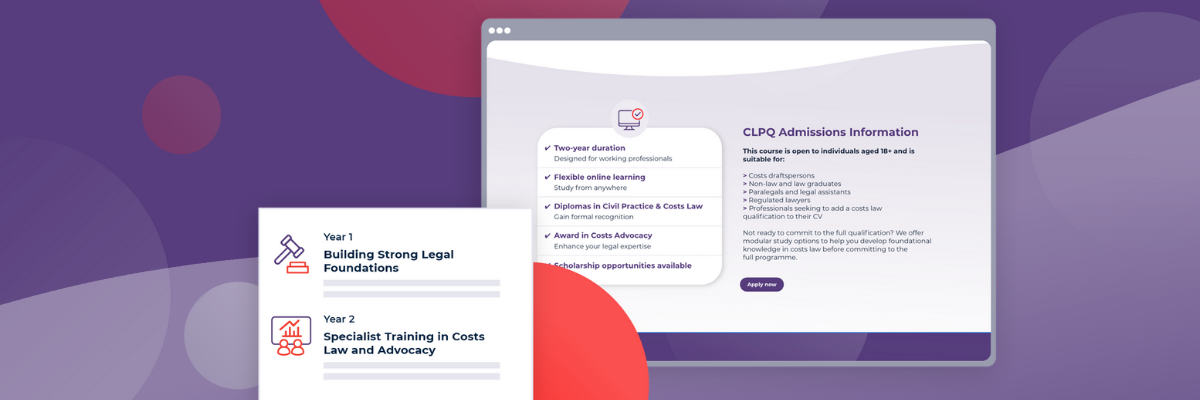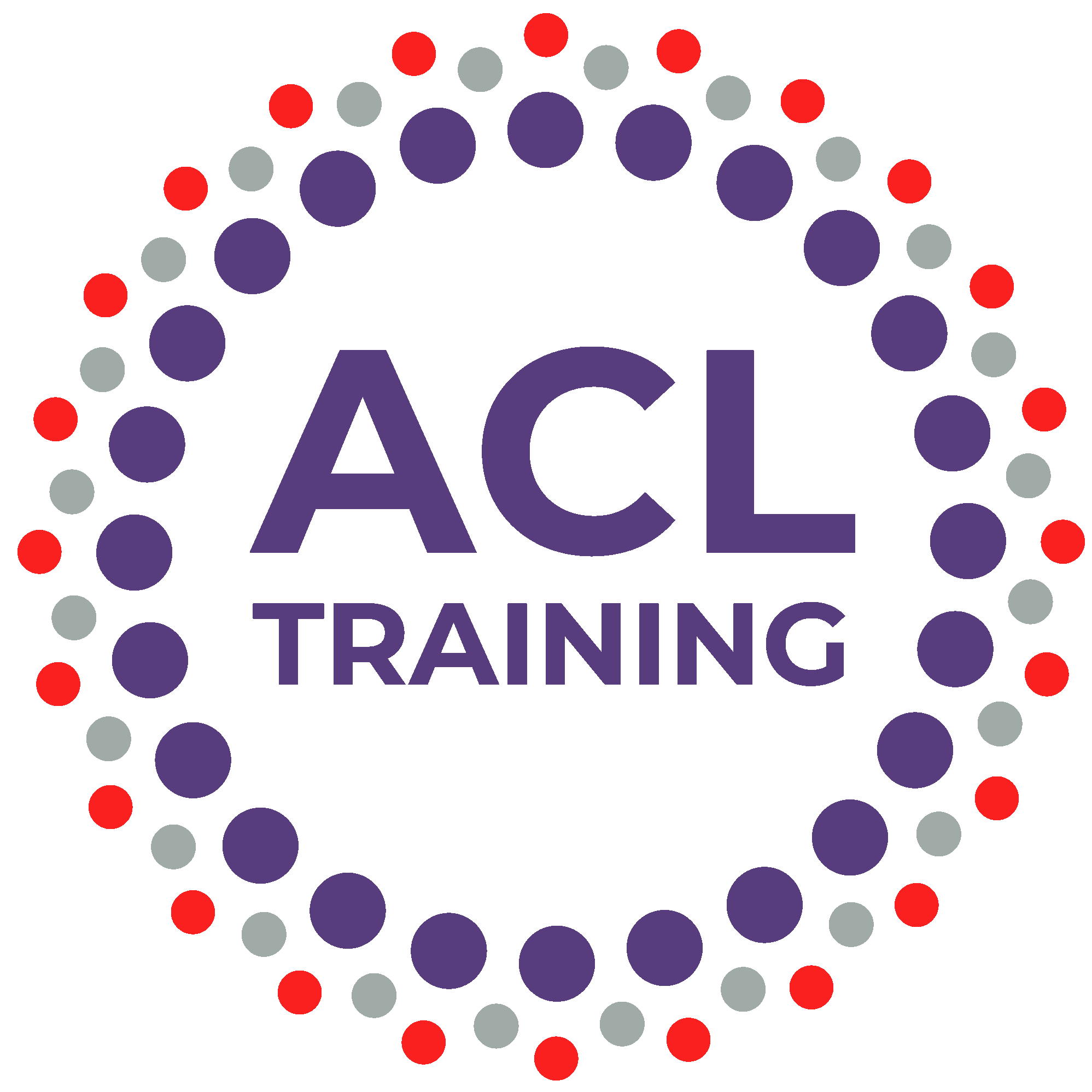Balancing Study and Work – How to Stay on Track While Training as a Costs Lawyer

Balancing a full-time job with studying for a professional legal qualification is a significant challenge. For many people working toward the Costs Lawyer Professional Qualification (CLPQ), the course is just one part of a busy timetable – with work deadlines, personal commitments, and often financial responsibilities all running in parallel.
The CLPQ is structured as a flexible, part-time programme delivered online over two years. While this flexibility is designed to help working professionals succeed, it doesn’t remove the pressure entirely. Staying on track requires planning, resilience, and a strategy that works with – not against – your schedule.
This blog is here to help. Based on what learners often face during the CLPQ, and drawing on practical tools and real-world examples, it provides guidance on managing time, prioritising tasks, staying connected, and avoiding burnout. Whether you’re just starting out or halfway through the course, these tips are designed to support you in finishing well, without sacrificing everything else in the process.
Managing Time When Hours Are Limited
For most learners, time is the first big hurdle. After a full day’s work, it can be hard to find the energy and focus to tackle legal materials or prepare for an online tutorial. Some people delay study until the weekend, but that can quickly lead to tasks piling up, especially as assessments or exam deadlines approach.
One key strategy is to treat study time with the same respect as a work meeting. Use a calendar or scheduling tool (like Google Calendar, Notion, or Outlook) to block out recurring time slots for study, ideally when your energy levels are higher. Some students find early mornings effective; others prefer short evening sessions.
The CLPQ is delivered in structured modules – such as the 8-week Contract Law or the 12-week Costs Pleadings and Process – so you can plan your time around blocks of learning. For instance, use the first week of a module to read ahead and the final two weeks to consolidate and revise. Small, consistent study slots (e.g. 30 minutes during your lunch break or one hour after work) are more sustainable than last-minute cramming.
And don’t forget to leave white space in your calendar – some time to reset and rest is just as important as active study.
Balancing Workload and Competing Priorities
It’s not just about fitting study into your week, it’s about doing it while managing everything else in your life. Learners often describe the feeling of being “stretched too thin,” particularly during periods of heavy workload or personal upheaval.
The problem isn’t always time – it’s priority management. Without a clear system, you may end up spending too much time on work admin or personal errands and miss a key study deadline. Tools like the Eisenhower Matrix can help break tasks down into urgent vs important, and deal with what matters most first.
Some learners set three priorities at the start of each week – one for work, one for study, one for life. This keeps things focused and manageable. Digital planners or apps like Todoist and Trello can help keep track of deadlines across all areas.
The CLPQ’s flexibility can also support learners during busy periods. If you’re overwhelmed, it’s possible to pause or defer a module and return to it later. This isn’t a failure – it’s a smart way to protect your wellbeing and performance. Speaking to your course tutor early can make all the difference if you feel things slipping.
Many learners also benefit from being transparent with their employers. Some firms offer study leave or adjust workloads during assessment periods. Even if formal policies aren’t in place, a proactive conversation can help you manage expectations. Consider speaking with your line manager, Head of Department or HR.
Staying Connected While Studying Remotely
One of the realities of the CLPQ is that it’s entirely online. While this makes it accessible for people working full-time, it can also feel isolating, especially if you’re used to in-person learning or miss having peers to talk through ideas with.
Staying connected can make a big difference in motivation and understanding. Many learners set up WhatsApp groups, online forums, or informal check-ins with others on their module. Just knowing someone else is studying the same topic can help you stay on track.
The course includes live tutorials delivered via video conference; an important touchpoint not just for understanding the content, but also for asking questions, getting clarification, and hearing different perspectives. Make the most of them by preparing a few questions in advance and reviewing your notes soon afterwards.
The course is delivered through Canvas, a user-friendly learning platform, where all materials, deadlines and support resources are all in one place – so you don’t need to search across multiple systems.
Avoiding Burnout and Managing Stress
Burnout doesn’t happen overnight. It builds slowly, a few late nights, a missed deadline, growing anxiety and suddenly the course feels like too much. If you’re balancing work, study, and personal commitments, it’s important to manage your time and energy wisely.
Start by recognising the signs of burnout, which can include physical fatigue, irritability, lack of motivation and difficulty concentrating. The earlier you notice them, the easier it is to make changes.
Set one or two non-negotiable self-care habits each week. These don’t need to be dramatic – a daily walk, an hour screen-free in the evening, or a proper lunch break can make a real difference. Try to separate study time from relaxation time, even if that just means closing your laptop and moving to a different room.
Remember: perfectionism is not your friend here. Aim for consistency, not brilliance every day. Progress – even in small steps – is better than exhausting yourself in pursuit of perfection.
And if things are getting on top of you, speak to your tutor, they’re there to support you. Asking for help early can often prevent small issues from becoming big problems.
You can also reach out to LawCare, a free and confidential support service for anyone in the legal profession. They offer a helpline, peer support, and resources to help manage stress, anxiety, and burnout.
Financial and Emotional Pressures
While the academic demands of the course often take centre stage, it’s important to acknowledge the broader financial and personal pressures many learners face. Some students are self-funding the CLPQ while covering rent or mortgage payments. Others are balancing study with caregiving responsibilities or supporting family members, all while working to advance their careers.
These pressures can’t be fixed with simple time management strategies, but acknowledging them is an important first step. If finances are tight, consider checking whether your employer offers support for professional development. Several learners have successfully secured partial or full funding by making a case based on their role and long-term contribution.
More broadly, it’s okay to acknowledge that finding balance is hard. You don’t need to have it all together. Talking to friends, colleagues, or a mentor can help ease the emotional load and give you space to reflect.
Final Tips – Your Topline Cheat Sheet
To recap, here are the key strategies covered in this blog – a simple reference to help you stay focused and balanced throughout the CLPQ:
- Use the course structure to guide your planning
The CLPQ is delivered in modules – plan your study time around these blocks to stay on track. - Block out study time consistently
Short, regular sessions (e.g. 30–60 minutes) are more effective and sustainable than last-minute cramming. - Use scheduling tools to stay organised
Digital calendars, to-do lists, and weekly planners can help you manage study, work, and personal commitments. - Prioritise based on urgency and importance
Apply simple frameworks to avoid overwhelm and focus on what matters most. - Make the most of tutorials and remote learning
Attend all sessions, prepare questions in advance, and stay connected through peer groups or forums. - Recognise the signs of burnout early
Protect time for rest and don’t hesitate to ask for support if you’re struggling to keep up. - Take advantage of course flexibility if needed
If work or life gets in the way, you can defer a module and return when ready, planning for the long-term matters. - Keep things in perspective
Progress over perfection. The goal is steady, sustainable momentum – not perfection in every module. - Ask for help
If you’re struggling with stress or burnout, LawCare offers emotional support specifically for legal professionals. It’s confidential, free, and easy to access.
Ultimately, training to become a Costs Lawyer while working full-time is a demanding path, but a rewarding one. With the right structure, support, and mindset, it’s entirely possible to succeed without burning out in the process.
That said, things don’t always go to plan and that’s okay. If you’re struggling, don’t wait until a crisis point to ask for help. The Welcome Centre on Canvas OLE contains the key policies you will need to refer to should you encounter difficulties in your studies, such as Mitigating Circumstances, Postponement of Studies, and Student Learning Support. Familiarise yourself with these key policies early on in your learning journey.
There are always options if you need to defer or postpone, and we can offer additional support if we know what you need. Please note, if you submit an assessment or sit an exam, we consider you as “Fit to Sit.” It is much better to let us know about problems before an assessment runs than after, so talk to us if anything is affecting your ability to prepare or perform. an assessment than after, so let us know if anything is affecting your ability to prepare or perform.
Need help or have questions?Email: [email protected]
Phone: +44 (0)7342 295127
Related Articles

A Year into the CLPQ: Lessons, Challenges and Real-World Wins
Twelve months ago, Sarah Jane Lewis shared why she chose the Costs Lawyer Professional Qualification (CLPQ), giving us a glimpse into the early stages of balancing work, study, and ambition. Now, a year in and halfway through the course, she’s reflecting on how the past year has shaped her skills, confidence and career direction. In […]

Qualifying as a Costs Lawyer: Recognition and Regulation
If you’re considering a career in law and want a role that blends litigation strategy, financial management, and client impact, qualifying as a Costs Lawyer could be the path for you. The Costs Lawyer Professional Qualification (CLPQ) offers a clear route into a regulated profession that plays a vital role in the justice system. Thinking […]

How to Apply for the Costs Lawyer Professional Qualification (CLPQ) in the UK and What You Need to Know Before You Do
Thinking about a legal career with impact, flexibility and progression? The Costs Lawyer Professional Qualification (CLPQ) could be your ideal route. This guide explains how to apply for the CLPQ, covering eligibility, course content and the benefits of qualifying as a regulated Costs Lawyer in England and Wales. In today’s legal landscape, costs law is gaining new visibility. […]
